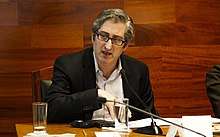David Shrier
David L. Shrier is an American futurist, author and entrepreneur.[1] He has written for numerous publications including Forbes, CNBC, Newsweek, and The Asian Banker. Shrier also co-edits the MIT Connection Science imprint of MIT Press and is the author of various industry reference books in the fields of financial technology,[2] digital identity, data governance[3] and financial innovation.[4] He is a globally recognized authority on financial innovation, serial entrepreneur, global educator, and government advisor.[5][6] Shrier is the founder & CEO of Distilled Identity, an artificial intelligence company derived from MIT research and spun out of MIT Media Lab.[7]
David Shrier | |
|---|---|
 Shrier speaking at Asian Banker Summit | |
| Nationality | American |
| Alma mater | Brown University |
| Occupation | CEO, Distilled Identity Fellow, Colorado School of Mines Associate Fellow, Oxford University Lecturer, MIT |
| Website | https://distilledidentity.com/ |
Career
He is also Vice Chairman of Endor,[8] a blockchain-enabled crowd intelligence platform; advisor to Millennium Advisors, a middle market credit liquidity provider, on technology trends and growth management; and served as strategic advisor to Ripple. Shrier has helped established organizations to develop and build new revenue streams, having developed growth opportunities with C-suite executives for Dun & Bradstreet, Wolters Kluwer, Ernst & Young, GE, The Walt Disney Company, AOL Verizon, and Starwood, as well as private equity and venture capital funds. He has led a number of private equity and venture capital-backed companies as CEO, CFO or COO.[9]
Learning Innovation
Shrier created the MIT online fintech course “Future Commerce” that educated thousands of students in over 120 countries, adapting his successful on-campus MIT graduate course of the same name (itself the first graduate fintech course in North America).[10][11] In 2017, he re-created his online programme at University of Oxford's Saïd Business School (SBS) under the name Oxford Fintech, and added a second programme Oxford Blockchain Strategy.[12] The Dean of SBS teaches one of the modules in Oxford Fintech. David also co-founded and is Chairman of Riff Learning, an MIT spinout company that is applying artificial intelligence to reshape collaboration. David is on the advisory board of WorldQuant University, a program offering a totally-free, accredited, online master's degree in financial engineering.[13]
Government & Regulatory work

Shrier has collaborated with regulators and policymakers in the US, UK, EU, and through the OECD its member countries, to help shape emerging policy on disruptive technologies. He is presently a member of the FinTech Industry Committee for FINRA, the U.S. securities industry's self-regulatory body; and the Fintech Trade & Investment Steering Board for the UK Government's Department of International Trade. David also advises the European Parliament, European Commission, and OECD on digital identity, AML/KYC, blockchain, and AI. He previously advised the European Commission on commercializing innovation with a focus on digital technology, and the Government of Dubai on blockchain and digital identity.[14]
Academia
Shrier has a triple academic appointment as an Associate Fellow with the Said Business School, University of Oxford; Lecturer at the MIT Media Lab; and Fellow with the Payne Institute at the Colorado School of Mines. Shrier has written for numerous publications including Forbes, CNBC, Newsweek, and The Asian Banker. He also co-edits the MIT Connection Science imprint of MIT Press and is the author of various industry reference books:
Books
- Frontiers of Financial Technology, New Solutions for Cybersecurity (with Alex Pentland) (2016)
- Trust::Data: A New Framework for Identity and Data Sharing (2016)
- New Solutions for Cybersecurity (MIT Connection Science and Engineering) (2018)
References
- "Davos 2018 Field Report : An Interview With David Shrier From University of Oxford Fintech". Forbes. January 28, 2018. Retrieved October 28, 2018.
- "New Solutions for Cybersecurity (The MIT Press)". MIT Press. April 25, 2018. Retrieved October 28, 2018.
- "Trust::Data: A New Framework for Identity and Data sharing". VisionaryFuture. April 25, 2018. Retrieved October 28, 2018.
- "Frontiers of Financial Technology: Expeditions in future commerce, from blockchain and digital banking to prediction markets and beyond". VisionaryFuture. April 25, 2018. Retrieved October 28, 2018.
- "This AI Tool Could Revolutionize Impact Investing". Forbes. April 25, 2018. Retrieved October 28, 2018.
- "Getting To Trusted Data Via AI, Machine Learning And Blockchain". Forbes. June 17, 2018. Retrieved October 28, 2018.
- "Distilled Analytics Launches Behavioral Analytics Model to Transform Financial Services". Distilled Analytics. January 18, 2018. Retrieved October 28, 2018.
- "Endor". Endor. January 18, 2018. Retrieved October 28, 2018.
- "Money20/20 Vegas 2018". Money2020. January 18, 2018. Retrieved October 28, 2018.
- "MIT's new online FinTech certificate course: Future Commerce". FinTech Profile. October 19, 2016. Retrieved October 28, 2018.
- "Future Commerce' Explores Innovation in Financial Technology". MIT Technology Review. April 11, 2016. Retrieved October 28, 2018.
- "Saïd Business School launches Blockchain Strategy programme to help businesses get to grips with new computing reality". Said Business School. November 15, 2017. Retrieved October 28, 2018.
- "WorldQuant University". WorldQuant University. April 11, 2016. Retrieved October 28, 2018.
- "David Shrier thinks we need a better model of how we deploy new technologies (and he's right)". CIO. June 6, 2018. Retrieved October 28, 2018.